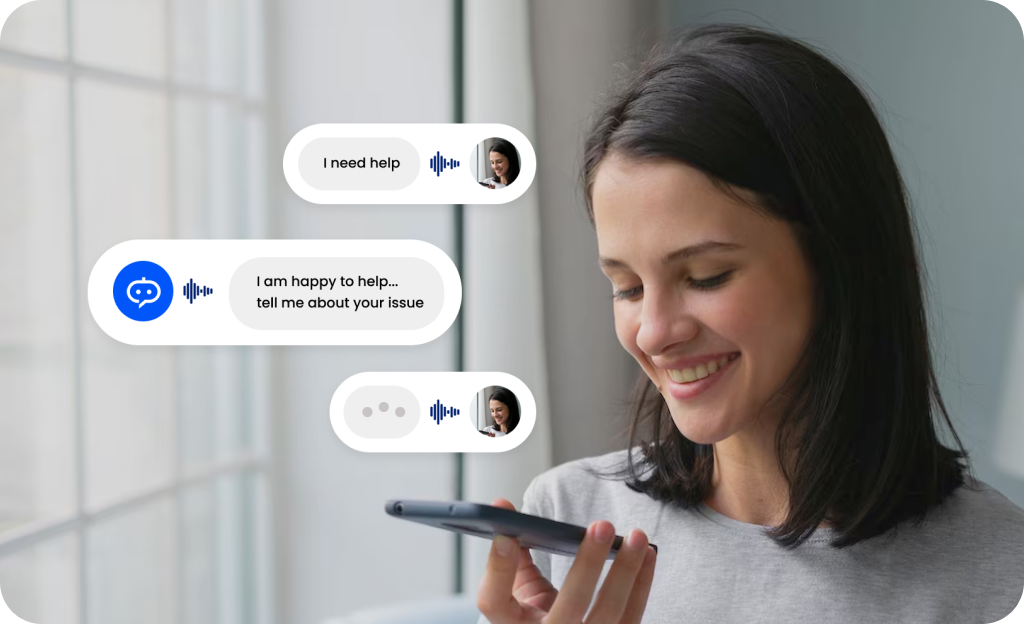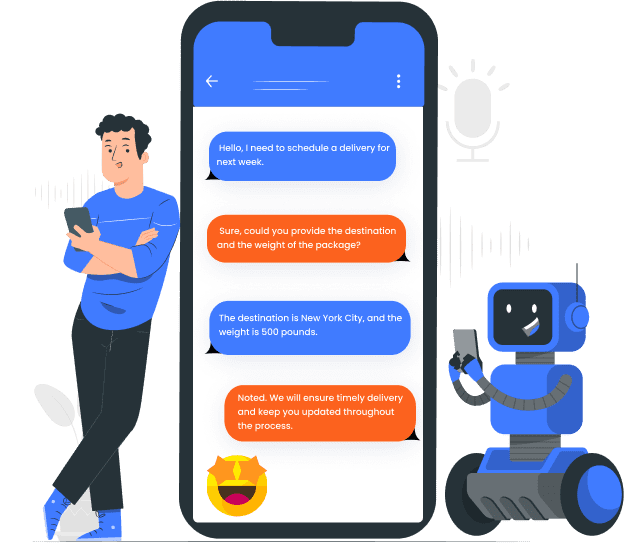#Smart Generative AI Agent
Check out Demo
Generative AI Powered Smart Bot Solution
Omni-Channel Bots – Deploy on Chat, Voice, Email, Instagram, Facebook, WhatsApp and Even SMSCheck out Demo

Trusted by hundreds of leading companies
























×
Check out the Enterprise Grade AI Agent Powered by Gen AI. No Setup Fees.
Revolutionizing Conversational AI: How ChatGPT is Leading the Way towards a Seamless Human-Machine Experience

With the rapid advancement of technology, our interactions with machines are constantly evolving. One
of the most exciting breakthroughs in this field is conversational AI, which employs natural language
processing to enable human-like interactions with computers. Leading this technological advancement is
ChatGPT, a large language model trained by Open AI. Capable of comprehending and responding to a
diverse range of human language inputs, ChatGPT has become an invaluable tool for various
applications, such as customer service, education, and entertainment. By harnessing ChatGPT’s
capabilities, businesses and organizations can create more personalized and engaging experiences for
their customers, revolutionizing the way we interact with machines and leading to a more connected and
intelligent future.
Furthermore, ChatGPT’s impact on conversational AI is significant, and its continued development and integration are likely to play a major role in shaping the future of human-machine interaction. Specifically, ChatGPT’s natural language processing capabilities can help businesses streamline customer interactions, increasing overall efficiency and creating more personalized experiences for their customers.
Furthermore, ChatGPT’s impact on conversational AI is significant, and its continued development and integration are likely to play a major role in shaping the future of human-machine interaction. Specifically, ChatGPT’s natural language processing capabilities can help businesses streamline customer interactions, increasing overall efficiency and creating more personalized experiences for their customers.
Transforming Logistics: ChatGPT/GPT-Technologies Disrupting the Industry for More Efficient and Connected Operations

In recent years, ChatGPT/GPT technologies have made a significant impact on the logistics industry,
revolutionizing the way operations are carried out. These technologies have brought about more
efficient and connected operations by streamlining communication between different players in the
supply chain. ChatGPT/GPT technologies allow for real-time data sharing and analysis, which helps
businesses optimize their processes and make informed decisions. By automating routine tasks and using
predictive analytics to anticipate potential issues, ChatGPT/GPT technologies help logistics companies
reduce errors, improve accuracy, and cut down on operational costs.
Additionally, these technologies enable faster response times and greater visibility, ensuring that goods are delivered to customers on time and with greater accuracy. As such, ChatGPT/GPT technologies are playing a game-changing role in transforming the logistics industry, empowering businesses to create more efficient and effective supply chains that deliver real value to customers.
Additionally, these technologies enable faster response times and greater visibility, ensuring that goods are delivered to customers on time and with greater accuracy. As such, ChatGPT/GPT technologies are playing a game-changing role in transforming the logistics industry, empowering businesses to create more efficient and effective supply chains that deliver real value to customers.
Breaking New Ground: How ChatGPT/GPT-Technologies are Paving the Way for the Future of Logistics

Let us discover the top 10 use cases that prove the powerful ROI of ChatGPT-powered chatbots in the
Logistics Sector:
1. Customer Service

The Factual Answering feature on the GPT platform is a game-changer for industries such as logistics,
where accuracy and efficiency are critical. By leveraging cutting-edge deep-learning algorithms, this
feature interprets the complex nuances of user inquiries, providing highly accurate and relevant
responses. With the logistics industry’s complex network of operations and processes, the Multi-Modal
capabilities of ChatGPT are particularly beneficial. It can handle different communication modes,
including text, audio, and image, which allows for seamless tracking and management of inventory. For
instance, ChatGPT’s ability to identify objects in images can greatly enhance inventory tracking and
management. Moreover, Image Generation and Text Completion features can help customers with various
queries, such as tracking packages, delivery times, and pricing information. This feature ensures that
customers receive consistent and accurate support throughout their interactions, leading to better
customer satisfaction and a more efficient supply chain. With ChatGPT’s advanced natural language
processing algorithms, the logistics industry can benefit from improved accuracy, efficiency, and
customer experience.
2. Quality Control

ChatGPT’s Speech-to-Text (STT) functionality is a powerful tool that can help the logistics industry
improve its quality control procedures. By outsourcing the transcription of customer and employee
voice recordings, businesses can efficiently analyze conversations and identify areas for improvement
in quality control. This can assist in enhancing precision, boosting productivity, and reducing costs.
Additionally, the STT feature can be utilized for voice-based inspection, which can improve the
accuracy of quality control data and reduce the likelihood of errors. By using ChatGPT to analyze real
voice-based inspection data from employees, businesses can obtain valuable insights into the condition
of shipments and the quality of products. This data can help businesses make informed decisions to
enhance customer satisfaction and reduce expenses related to product returns.In summary, ChatGPT’s STT
functionality provides the logistics industry with a powerful tool to improve quality control
procedures, increase accuracy, and enhance customer satisfaction.
3. Manage the Supply Chains

Predictive analytics is a powerful tool that logistics companies can use to better understand and
manage their supply networks. The GPT-based Logistics Bots offers advanced predictive analytics
capabilities that can examine past data and market patterns to forecast future product demand. This
can help logistics companies optimize inventory levels, minimize waste, and avoid stockouts. By
leveraging the GPT platform’s features like Clustering and Diversity Measurement, predictive analytics
capabilities may assist logistics companies in optimizing delivery routes. This can minimize delivery
times, reduce fuel costs, and increase customer satisfaction. Additionally, the predictive analytics
feature can evaluate data from sensors and other sources to predict impending equipment failures. This
can help logistics companies avoid costly equipment downtime, increase efficiency, and ensure the
timely delivery of goods. In summary, the predictive analytics capabilities of the GPT-based Logistics
Bots provide logistics companies with a powerful tool to improve their supply chain operations,
increase efficiency, and enhance customer satisfaction.
4.Fraud Detection

The use of ChatGPT-like bots in the logistics industry can significantly improve fraud detection,
especially in customer assistance and communication. Features like Anomaly Detection can be employed
by various sectors, including billing and payments, inventory management, and shipping and delivery,
to detect fraudulent activities. Additionally, the Classification feature can be used to segregate a
large volume of customer contacts and spot patterns of questionable conduct, such as unexpected refund
requests. By analyzing data from various sources, such as customer behavior, transaction records, and
other data sources, GPT-based Logistics Bots can identify fraudulent patterns that traditional
rule-based approaches may not detect. Moreover, logistics chatbots can interact with customers to
identify potentially fraudulent activities and take proactive measures to prevent further fraud.
Overall, the use of ChatGPT-like bots in logistics can improve fraud detection and reduce losses due
to fraudulent activities.
5.Accurate and Detailed Product Descriptions

ChatGPT’s Text Completion and Generation feature can be used to enhance product descriptions in
logistics catalogues, marketing materials, and e-commerce sites. By training ChatGPT on previous
product descriptions and using its natural language processing capabilities, businesses can produce
more accurate and comprehensive descriptions of their products. The GPT-based Logistics Bots may also
be employed to create reports and summarise data with the aid of features like Clustering and
Summarization. By examining data from a variety of sources, such as supply chain reports, ChatGPT can
provide insights and recommendations for enhancing logistics operations. By employing features like
Recommendations and Search, logistics businesses may benefit from enhanced supply chain management,
fewer delays, and cost savings. This can result in a competitive advantage for businesses in the
logistics sector.
6. Fleet Management

Reinforcement Learning is a valuable feature of the GPT-based Logistics Bots that can help
logistics
companies with fleet management. Fleet management software utilizes this feature to make informed
decisions that optimize the performance and efficiency of a fleet of vehicles. This software’s “agent”
uses a reward system to determine vehicle routing and scheduling, receiving positive feedback for
excellent decisions and negative feedback for poor ones. By analyzing historical data and training
methods, the Bot learns to make better decisions based on criteria like on-time delivery,fuel
efficiency, and vehicle utilization. The agent adapts to changing conditions and improves the fleet’s
performance by continually learning and adjusting. This technology is useful for logistics companies
that want to reduce costs, increase efficiency, and improve customer satisfaction by optimizing their
fleet’s performance.
7.Risk Management

Logistics companies can benefit from the GPT-based Logistics chatbots’ Text-to-Speech (TTS) and
Anomaly Detection features, along with Translation capability, to improve their risk management. With
real-time alerts, automated warnings, multilingual communication, and consistent messaging, logistics
companies can better anticipate and mitigate potential risks. ChatGPT’s features can generate
real-time alerts for potential risks like inclement weather and traffic congestion, enabling logistics
operators to implement contingency plans quickly. Additionally, automated warning systems that use
natural language processing (NLP) and machine learning (ML) algorithms can notify drivers and
employees of potential dangers, such as hazardous materials and dangerous driving conditions.
Multilingual communication is crucial in the logistics industry, and ChatGPT’s TTS can communicate in
multiple languages, especially when interacting with international customers and partners. These
features enable logistics companies to take a proactive approach to risk management and increase
safety levels across their supply chains.
8. Inventory Management

GPT-based Logistics Bots’ unique demand forecasting feature can be a powerful tool for
inventory
management in the logistics industry. By utilizing features like Clustering and Diversity Measurement,
ChatGPT can analyze previous sales data, market trends, and other relevant factors to forecast future
demand for goods and services. In logistics, demand forecasting can also be used to anticipate future
demand for specific items. This enables logistics companies to adjust their inventory levels and
ensure that the right products are available at the right time. This use case of logistics
chatbots
can enhance inventory management strategies, reducing the risk of stockouts and overstocking. It can
lead to increased customer satisfaction, less waste, and higher profits.
9. Route Optimisation

The route optimization capability of the GPT platform is a valuable tool for the logistics industry,
as it can significantly improve delivery times, lower costs, and increase customer satisfaction. The
platform’s optimization algorithms use advanced techniques like linear programming, mixed-integer
programming, and convex optimization to solve complex problems. These algorithms take into account
several variables, such as traffic patterns, weather conditions, delivery schedules, and vehicle
capacity, to generate optimal route plans. The platform’s optimization algorithms baked into the
GPT-based Logistics Bots are continually improving, thanks to machine learning and
reinforcement
learning, resulting in faster, more efficient, and more reliable delivery processes. The optimization
feature can help logistics companies to enhance their operations, reduce fuel consumption, decrease
transportation time, and improve overall supply chain management.
10. Maintenance of Equipment

The GPT platform’s ability to predict maintenance is a valuable tool for the logistics industry,
allowing companies to save time and money while enhancing safety and reliability. By collecting data
from sensors and other sources and analyzing it with features such as Clustering and Recommendation,
GPT-based Logistics Bots can forecast impending equipment problems and arrange repairs or
replacements
in advance. This not only reduces downtime and maintenance costs but also helps prevent safety
hazards. For example, in the logistics business, predictive maintenance can be used to monitor the
condition of trucks and delivery vans by evaluating data from sensors that monitor parameters such as
tyre pressure, engine performance, and fuel economy. By identifying potential problems before they
lead to breakdowns or accidents, predictive maintenance models improve the safety and reliability of
the logistics fleet.
Introducing Streebots for Logistics Industry

A state-of-the-art solution powered by the latest in NLP and GPT technology. We’ve developed this
solution to make the Logistics sector more secure and efficient!
Streebo’s ChatGPT solution is a game-changer in the AI industry, specifically designed to meet the unique requirements of the Logistics sector. The solution utilizes advanced GPT language models and OpenAI’s API technology to generate highly human-like conversation prompts and responses, empowering businesses to engage more effectively with their customers online. This innovative technology is powered by top-tier NLP engines from industry leaders, including IBM Watson, Amazon Lex, Microsoft’s CLU, and Google Dialog. The Logistics Bots from Streebo, powered by this cutting-edge technology, provide an unmatched level of personalized customer service. The integration of Streebo’s Bot Solutions with the latest GPT models opens up infinite possibilities for customer service innovation in the Logistics industry.
Streebo’s Logistics Bots can offer superior engagement and automation, resounding ROI, and guaranteed adoption.
Streebo’s ChatGPT solution is a game-changer in the AI industry, specifically designed to meet the unique requirements of the Logistics sector. The solution utilizes advanced GPT language models and OpenAI’s API technology to generate highly human-like conversation prompts and responses, empowering businesses to engage more effectively with their customers online. This innovative technology is powered by top-tier NLP engines from industry leaders, including IBM Watson, Amazon Lex, Microsoft’s CLU, and Google Dialog. The Logistics Bots from Streebo, powered by this cutting-edge technology, provide an unmatched level of personalized customer service. The integration of Streebo’s Bot Solutions with the latest GPT models opens up infinite possibilities for customer service innovation in the Logistics industry.
Streebo’s Logistics Bots can offer superior engagement and automation, resounding ROI, and guaranteed adoption.

Some of the features
include:
- Built-in domain intelligence
- Omnichannel experience on all platforms such as Facebook, WhatsApp, and Website
- Data security and compliance
- Advanced chat analytics
- Lower TCO
- Inbuilt live agent support
- Multi-lingual support
- Support of both Voice and Chat as well as
- Secured communication
- Context Switching Capabilities
- 99% Accuracy
- Secure Transactions and Text Exchange- When it comes to data processing and security, there can be no compromises. Our Bots understand this and use only the best in the industry – IBM Watson, Google’s GCP, Amazon’s Lex, and Microsoft Copilot Studio, Power Virtual Agents, to name a few. These branded NLPs provide unmatched peace of mind to enterprises that cannot afford any data breaches. But that’s not all – we go one step further by ensuring that all sensitive and other types of data are encrypted and masked using advanced algorithms. And with Open AI’s GPT Text Generation feature, there’s no need to worry about any manipulation, computation, or processing of business data. As a business owner, you can rest easy knowing that our Bots are the perfect ally to combat cybercrime and protect your sensitive information
Clients that have deployed these Smart Bots are seeing

 Increase in Revenue ~1-5%
Increase in Revenue ~1-5%
 Improvement in Customer Satisfaction Ratings ~5-9%
Improvement in Customer Satisfaction Ratings ~5-9%
 Reduction in customer service costs in half (50%+)
Reduction in customer service costs in half (50%+)
- We guarantee to cut your current customer service costs in HALF!!
Final Food for Thought for Logistics Sector Leaders!

The rise of cutting-edge technologies like AI has revolutionized the logistics industry, enabling
companies to improve their operations, enhance customer experience, and optimize supply chain
management. The integration of AI-based solutions has led to increased efficiency, cost savings, and
faster delivery times. According to market statistics, the global AI in the logistics market is
projected to grow significantly, with a CAGR of over 40% from 2021 to 2028. The growth is driven by
the increasing demand for automation, rising customer expectations for fast and reliable delivery, and
advancements in AI technology. The market is also witnessing significant investment in research and
development by leading players in the industry, as they seek to leverage AI to gain a competitive
edge. The future of logistics is heavily reliant on AI-based solutions, and companies that embrace
this technology are poised for success in the long run.
Streebo is disrupting the logistics industry with its ChatGPT Logistics Bots, which provide businesses with a cutting-edge conversational AI experience. By integrating the latest regenerative AI capabilities of the GPT platform with leading NLP tools from IBM Watson, Google Dialog, Microsoft Copilot Studio, Power Virtual Agents, and Amazon Lex, this solution offers unparalleled benefits. Customers can enjoy unprecedented levels of convenience and efficiency, making it easier for them to access the care they require. To stay ahead of the competition and reap the rewards of this state-of-the-art technology, visit the Logistics Bot webpage today and schedule a personalized demo. Don’t miss out on the chance to take your logistics services to the next level!
Streebo is disrupting the logistics industry with its ChatGPT Logistics Bots, which provide businesses with a cutting-edge conversational AI experience. By integrating the latest regenerative AI capabilities of the GPT platform with leading NLP tools from IBM Watson, Google Dialog, Microsoft Copilot Studio, Power Virtual Agents, and Amazon Lex, this solution offers unparalleled benefits. Customers can enjoy unprecedented levels of convenience and efficiency, making it easier for them to access the care they require. To stay ahead of the competition and reap the rewards of this state-of-the-art technology, visit the Logistics Bot webpage today and schedule a personalized demo. Don’t miss out on the chance to take your logistics services to the next level!
Disclaimer: ChatGPT and
GPT are
registered trademarks and terms fully
owned by Open.AI. The author has used the term
“ChatGPT Logistics ” to convey the idea of a ChatGPT kind of Bot, but for Logistics .
Make a visit to our demo store to preview the library of entire Smart,cloud-ready solutions
Schedule your demo today!!






